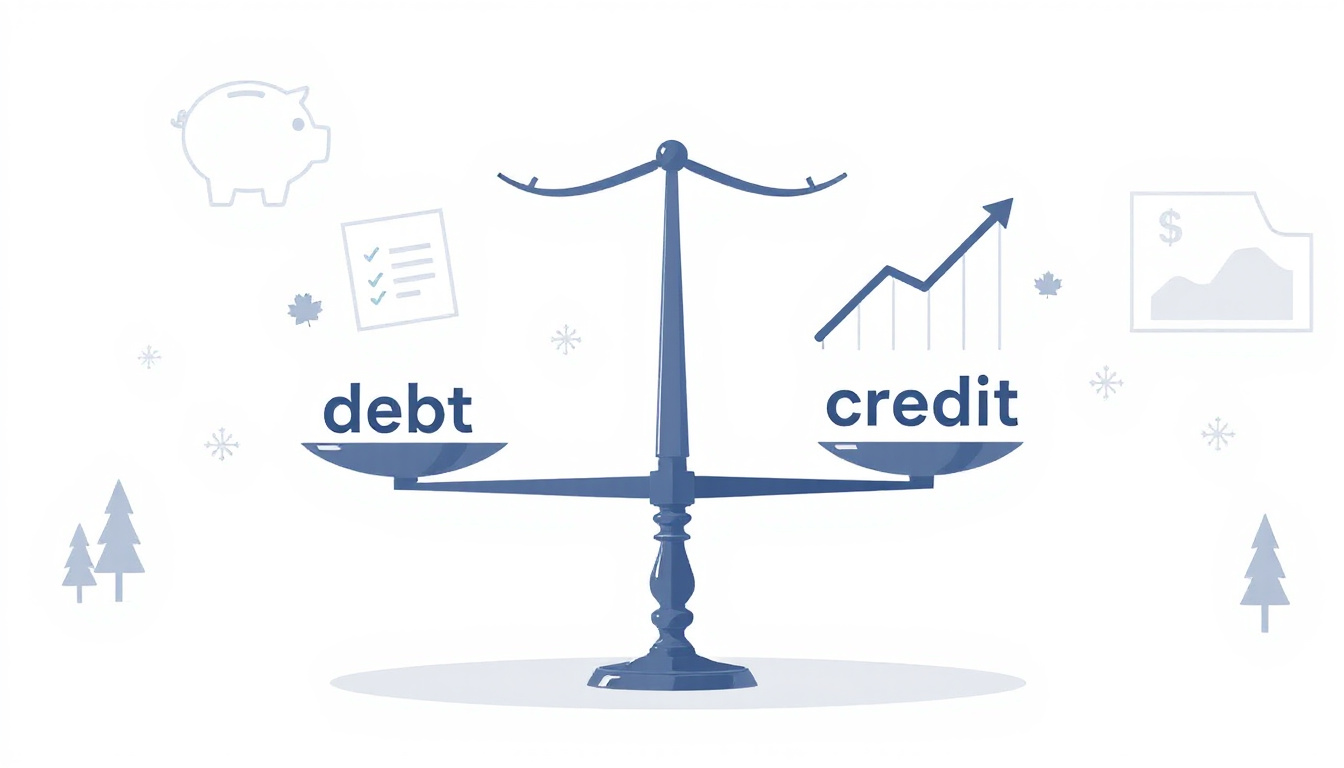Building your credit as a newcomer to Canada can feel overwhelming, particularly when you’re keen to establish a good financial foundation without falling into the trap of debt. Having a healthy credit score is crucial for your financial mobility, enabling you to access loans, credit cards, and even secure housing or job opportunities. It’s important to understand the basic principles of credit, the best strategies for building it responsibly, and lifestyle decisions that can prevent you from accumulating debt as you navigate this new financial landscape in Canada. In this comprehensive guide, we’ll explore effective steps you can take to build your credit while maintaining financial wellness, along with essential resources specifically designed for newcomers.

Key Takeaways
- Understanding credit basics is essential for newcomers to establish a strong financial foundation.
- Building credit responsibly involves making timely payments and using credit cards wisely.
- Avoiding debt while building credit can be achieved by setting budgets and limiting credit use.
- Utilizing tools like secured credit cards can help newcomers build credit without risking significant debt.
- Exploring resources specifically designed for newcomers can provide valuable guidance on improving credit scores.
Understanding Credit Basics
Building credit as a newcomer in Canada can feel overwhelming, especially if you’re trying to navigate the system without falling into debt. Understanding credit basics is essential in establishing a solid financial foundation. Credit, at its core, refers to the trust that lenders have in your ability to repay borrowed money. In Canada, your credit report and credit score are vital components of this system. A good credit score can lead to better financing options, lower interest rates, and improved chances of loan approval or rental applications. As a newcomer, it’s essential to familiarize yourself with how credit works, including the factors that impact your score—such as payment history, credit utilization, and the length of your credit history. This foundational knowledge will enable you to build credit wisely and strategically, ensuring you do not find yourself accumulating unnecessary debt.
Steps to Build Credit Responsibly
Building credit as a newcomer in Canada is vital for establishing financial health and accessing better loan terms in the future. Here’s a step-by-step guide to help you navigate the process without incurring debt:
###
1. Understand What Credit is
Start by educating yourself about credit scores and reports. In Canada, credit scores typically range between 300 and 900, with anything above 660 considered good. Credit bureaus like Equifax and TransUnion generate your credit report, which lenders use to evaluate your creditworthiness.
###
2. Get a Social Insurance Number (SIN)
Obtaining a SIN is crucial, as it helps identify you in financial systems. You will need this number when applying for credit products.
###
3. Open a Canadian Bank Account
When integrating into Canada, opening a bank account with a reputable Canadian institution is a fundamental step. This will serve as a financial hub for your transactions and help with managing funds.
###
4. Apply for a Secured Credit Card
A secured credit card requires a deposit that acts as collateral and sets your credit limit. Use it responsibly—making small, manageable purchases and paying off the balance in full each month avoids drawing debt while building your credit history.
###
5. Pay Your Bills On Time
Establish a habit of paying all your bills on time, including utilities, internet, and your rent. Late payments can have a negative impact on your credit score.
###
6. Consider Becoming an Authorized User
If you have a family member or close friend with a good credit history, ask if you can be added as an authorized user on their credit card. This can help boost your credit score without the risk of accruing debt yourself.
###
7. Diversify Your Credit
Once you establish a basic credit record, consider taking out a small personal loan or applying for a store card. Different types of credit contribute positively to your credit score, provided you manage these responsibly.
###
8. Monitor Your Credit Report
Regularly check your credit report for errors and inaccuracies. You are entitled to one free credit report each year from each bureau. Address any inaccuracies as they can impact your score negatively.
###
9. Be Patient and Persistent
Building credit takes time, so it’s important to remain patient. Continue to manage your finances responsibly, and you’ll see progress in your credit score.
‘The best way to predict the future is to create it.’ – Peter Drucker

Tips for Avoiding Debt While Building Credit
Building credit as a newcomer in Canada can feel daunting, especially if you’re concerned about incurring debt. However, it is quite possible to establish a strong credit history without overspending. Here are some practical tips to help you get started:
1. Choose a Secured Credit Card: A secured credit card is a great initial step. It requires a cash deposit that serves as your credit limit, reducing the risk of debt.
2. Keep Your Balance Low: Aim to use no more than 30% of your credit limit. This helps demonstrate that you can manage credit responsibly.
3. Pay Your Bills on Time: Consistently making payments on time is one of the most effective ways to build your credit. Set up reminders or automatic payments to help you stay on track.
4. Avoid Unnecessary Credit Applications: Each credit application can slightly lower your credit score. Only apply for credit when necessary, and space out your applications over time.
5. Consider Getting a Co-Signer: If you have a trusted friend or family member with good credit, seeing if they’ll co-sign on a loan can help you receive credit under more favorable terms.
By following these strategies, you can build your credit in Canada while keeping your finances stable and avoiding unwanted debt.
Resources for Newcomers to Improve Credit
Building credit as a newcomer in Canada can seem daunting, but there are effective strategies to improve your credit score without incurring debt. First, you should consider obtaining a secured credit card. This type of card requires a cash deposit that serves as your credit limit, making it easier to manage expenses while establishing a credit history. Use your card responsibly—make small purchases and pay them off in full each month to avoid interest charges.
Another option is becoming an authorized user on a family member or friend’s credit card. Their positive credit history can benefit you, but make sure they have a good payment record to avoid any negative impact. Additionally, consider setting up a credit-builder loan with a local credit union. This loan allows you to save money over a period while making regular payments, thus establishing credit without taking on unnecessary debt.
One important resource for newcomers is the Canadian Credit Bureau, which provides various educational materials on understanding credit scores and how they impact your financial landscape. You can also explore community programs or workshops offered by local immigrant services that focus on financial literacy, often tailored specifically for newcomers. Learning about budgeting and managing your finances effectively will help you build a strong credit profile while maintaining financial stability.
Furthermore, regularly checking your credit report can keep you informed about your progress and ensure there are no errors that could affect your score. You can access your credit report for free once a year from each of the two major credit bureaus in Canada—Equifax and TransUnion. By understanding your credit awareness journey and utilizing these resources, you can build credit safely and effectively without falling into debt.
Frequently Asked Questions
What are the basic concepts of credit that newcomers should understand?
Newcomers should understand key concepts such as credit scores, reports, and the significance of on-time payments. A credit score is a numerical representation of creditworthiness based on financial history, and a credit report is a detailed account of credit activity.
What steps can newcomers take to start building credit responsibly?
Newcomers can build credit by applying for a secured credit card, becoming an authorized user on a family member’s credit card, and ensuring they pay all bills, including utilities, on time.
How can I avoid going into debt while building my credit?
To avoid debt while building credit, newcomers should stick to a budget, limit use of credit cards to manageable amounts, and pay off balances in full each month.
What resources are available for newcomers looking to improve their credit?
Newcomers can utilize online financial education platforms, community workshops, and nonprofit credit counseling services to learn more about building credit and managing finances.
How long does it typically take to build a good credit score as a newcomer?
While it varies based on individual circumstances, it usually takes several months to a few years of responsible credit use to establish a good credit score, depending on the methods used and consistency in payments.
